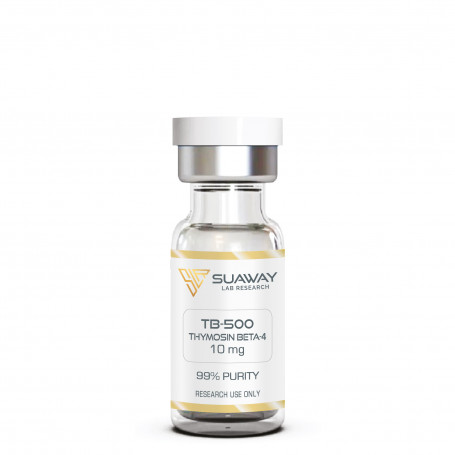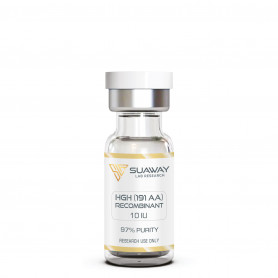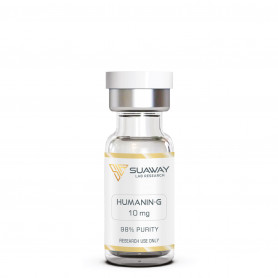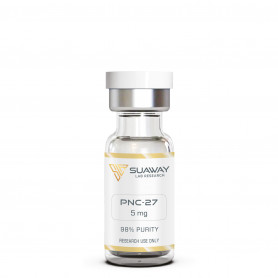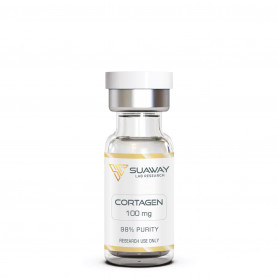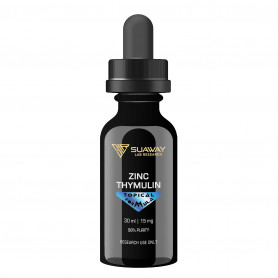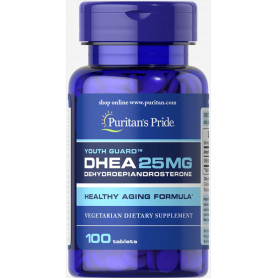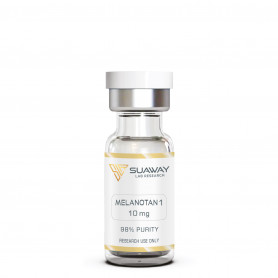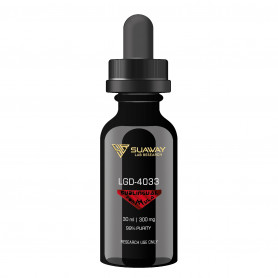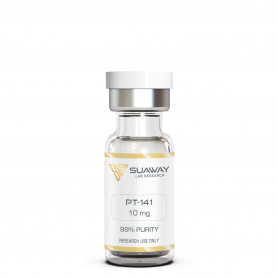TB-500 - THYMOSIN BETA-4 - 10 mg
Thymosin Beta-4 is a 43 amino acid peptide sequence. Recent research and clinical trials done utilizing TB-500 (Thymosin Beta 4) have established that it has a variety of advantages, including the following:
- Improves blood vessel growth
- Controls wound healing
- Reduces inflammation
- Minimises oxidative injury to the heart and central nervous system
Additionally, it aids in tissue regeneration, remodeling, and protection of wounded or damaged tissues.
Beschreibung
STRUCTURE
Sequence: Ac-Ser-Asp-Lys-Pro-Asp-Met-Ala-Glu-Ile-Glu-Lys-Phe-Asp-Lys-Ser-Lys-Leu-Lys-Lys-Thr-Glu-Thr-Gln-Glu-Lys-Asn-Pro-Leu-Pro-Ser-Lys-Glu-Thr-Ile-Glu-Gln-Glu-Lys-Gln-Ala-Gly-Glu-Ser
Molecular Formula: C212H350N56O78S
Molecular Weight: 4963.4408 g/mol
CAS number: 77591-33-4
Peptide purity: greater than 98%
Other details: No TFA Salt, No Mannitol
Storage: Lyophilized peptide must be stored at -20°C and peptide solution at 4°C.
Tb-500 has good oral and excellent subcutaneous bioavailability.
DESCRIPTION
A hormone produced by the thymus is called thymosin. Its main purpose is to promote the development of T cells, a significant immune system component. Additionally, thymosin aids in the conversion of B cells into plasma cells, which make antibodies.
One of the main mechanisms of action of Thymosin Beta-4 is its regulation of Actin. The protection, regeneration, and remodeling of wounded or damaged tissues have been revealed to be significantly influenced by Tβ 4. Platelets and many other kinds of cells produce Tβ4 after an injury to preserve the most injured cells and tissues, as well as to lessen inflammation and microbial development.
Recent research has shown that a gene called Tβ4 is the first to get activated after damage. Tβ4 helps the body start the healing process by helping new blood vessels grow in the wounded region, bringing blood, nutrients, and healing agents to the area. Tβ4 has anti-inflammatory effects as well and acts to reduce the production of cytokines, which are inflammatory agents. Tβ4 may have a wide-ranging effect since inflammation is a major contributor to the symptoms of many other disorders (such as Lyme disease, CFS, FM, autoimmune diseases, infections, etc.).
Tβ4 has become a useful therapeutic agent as a result of the function it plays in the immune regulatory process. HIV, AIDS, influenza, colds, and other illnesses have all been treated using Tβ4.
TB 500 may also go through the body over a great distance due to its distinct molecular structure. This allows it to have a "systemic" impact, locating and helping the bodily parts that are injured. Reduced inflammation and improved flexibility are two additional advantages of taking TB 500. There have even been some reports of regrowing and darkening of hair.
The use of Tβ4 in mammalian cells caused wound healing in cutaneous, corneal, and cardiac cells.
These claims are backed by research by Phlip and Kleinman, who used Tβ4 as a topical therapy to repair lesions caused by heptanol and alkali to the skin and eyes of rats and mice.
The mice were treated twice daily with liquid ocular drops of 5 micrograms/5 microliters. The corneal epithelium quickly traveled across the cornea's surface when the drops were applied to heal the tissue that had been destroyed by the alkali insult. Because the alkali damage is seen as a burn, there is a significant degree of inflammation there. Topical Tβ4 drops reduce inflammation by increasing nF kappa b, activating nF kappa b, and inhibiting the production of TNF cytokine and matrix metalloproteinases. Tβ4 also boosts the production of laminin-5, which helps in maintaining cellular contact or migration in the corneal epithelium as well as lowering levels of apoptosis and boosting angiogenesis in tests.
The effects of Tβ4 on the skin's natural healing process were also investigated by the researchers. Tβ4 hydrogel or PBS was applied to full-thickness punch dermal wounds on rats and mice, with dosages ranging from 5 to 50 micrograms/50 microliters/wound. The use of Tβ4 increased the rate of collagen deposition, keratinocyte migration, and angiogenesis in cutaneous wound healing. Different branches of this same research, which used rats and mice, found that using Tβ4 sped up the healing process in the test animals. These test subjects had various types of impaired healing, such as diabetes or old age.
Tβ4 has been proven to have favorable benefits in numerous animals when treating cardiovascular illness, nerve damage, septic shock, and cutaneous injuries. Tβ4 was typically injected intracardially at a dosage of 400 ng; retro-infusion doses were typically in the range of 15 mg.
Tβ4 is regarded as "cardioprotective"; it was shown in mouse models of coronary ligation that Tβ4 encouraged healing across the heart muscle. Additionally, it was shown to inhibit circulatory system damage in the sheep refusion injury model. Tβ4 improves the function of the heart, lowers levels of fibrosis, and increases cell survival rates by activating integrin-linked kinase and boosting cell migration, survival, and activation in the heart.
As was previously mentioned, Tβ4 aids in reducing cytokine levels that cause inflammation in the body. Phlip and Kleinman administered an endotoxin to rats to test the anti-inflammatory effects of Tβ4 since proinflammatory cytokines contribute to septic shock. Following the injection of the endotoxin, Tβ4 was given right away, two hours later, and then again four hours later.
The lethality of endotoxin-induced septic shock and the inflammatory mediators associated with it were both shown to be significantly decreased after the T-4 dose. The fascinating phenomenon seen by the researchers was that Tβ4 levels spontaneously decreased in rats when sepsis was induced. Tβ4 may be an essential treatment for sepsis as shown by the fact that its levels were reduced in both rats with endotoxin injection and those with non-induced septic shock.
Similar to the cardiovascular system, both in vivo and in vitro, Tβ4 is regarded as protective in the neurological system. Kainic acid was administered to rats to cause the loss of hippocampus neurons. Tβ4 was given to the rats twice daily for five days after the kainic acid treatment to stop the loss of neurons.
In addition, animals with autoimmune encephalomyelitis received 6 mg/kg of Tβ4 every three days after the illness was first caused. Treatment with Tβ4 has been proven to help lower overall inflammation, increase the number of mature oligodendrocytes, and aid enhance functioning. Tβ4 has also been shown to be protective in vitro against ethanol toxicity and glutamate-induced toxicity.
TB-500 was shown to be a gene that was four to six-fold up-regulated during the early stages of blood vessel development and was shown to encourage the development of new blood cells from the existing capillaries. When given subcutaneously, this peptide, which is found in wound fluid, improves wound healing, and muscle growth, and quickens the recovery of muscle fibers and their cells. The fact that TB-500 encourages cell migration by specifically interacting with actin in the cell cytoskeleton is another crucial aspect of the compound. A core tiny amino acid long-actin binding domain has been shown to possess properties for both blood cell proliferation and wound healing. Accelerating the migration of keratinocytes and endothelial cells reveals these properties. Additionally, it boosts the production of enzymes that break down the extracellular matrix.
Thymosin Beta 4 (TB-500), which has been the subject of recent investigations and clinical trials, has been shown to have several positive effects on various body parts:
● Differentiation of blood vessel endothelial cells
● In dermal tissues, angiogenesis (the formation of new blood cells from pre-existing capillaries)
● Keratinocyte migration
● Collagen deposition
● Reduces tissue inflammation in joints
● Increased strength and endurance, along with significant improvements in muscle mass
● Stretching connective tissue improves flexibility.
● Prevents the development of fibrous bands and adhesions in the muscles, tendons, and ligaments.
● Reduces muscular cramps
● Greater muscular tone
● Increased cellular substance exchange
● Increases tissue regeneration
● Decreases the extent of the infarct and enhances cardiac function
● Therapeutic impact on the dry eye condition and corneal injuries
● Hepatic antifibrotic action
● Speeds up hair growth
REFERENCES
A. Goldstein et al., "Thymosin β4: a multi-functional regenerative peptide. Basic properties and clinical applications" [PubMed]
A. Goldstein et al., "Advances in the basic and clinical applications of thymosin β4" [PubMed]
D. Crockford et al., "Thymosin beta4: structure, function, and biological properties supporting current and future clinical applications" [PubMed]
G. Sosne et al., "Biological activities of thymosin beta4 defined by active sites in short peptide sequences" [PubMed]
E.G. Yarmola et al., "Thymosin beta4: actin regulation and more" [PubMed]
M. Badamchian et al., "Thymosin beta(4) reduces lethality and down-regulates inflammatory mediators in endotoxin-induced septic shock" [PubMed]
A. Gonzales-Franquesa et al., "Discovery of thymosin β4 as a human exerkine and growth factor" [PubMed]
J.D. Young et al., "Thymosin beta 4 sulfoxide is an anti-inflammatory agent generated by monocytes in the presence of glucocorticoids" [PubMed]
M.R. Bubb "Thymosin beta 4 interactions" [PubMed]
Y. Xing et al., "Progress on the Function and Application of Thymosin β4" [PubMed]
N. Shomali et al., "A new insight into thymosin β4, a promising therapeutic approach for neurodegenerative disorders" [PubMed]
S. Munshaw et al., "Thymosin β4 protects against aortic aneurysm via endocytic regulation of growth factor signaling" [PubMed]
G. Renga et al., "Thymosin β4 limits inflammation through autophagy" [PubMed]
Y. Wang et al., "Adjunctive Thymosin Beta-4 Treatment Influences MΦ Effector Cell Function to Improve Disease Outcome in Pseudomonas aeruginosa-Induced Keratitis" [PubMed]
K.W. Freeman et al., "Regenerative protein thymosin beta-4 is a novel regulator of purinergic signaling" [PubMed]
G. Sosne et al., "Thymosin beta 4 promotes corneal wound healing and decreases inflammation in vivo following alkali injury" [PubMed]
J. Zhang et al., "Thymosin beta4 promotes oligodendrogenesis in the demyelinating central nervous system" [PubMed]
Rui Yu et al., "Recombinant Human Thymosin Beta-4 Protects against Mouse Coronavirus Infection" [PubMed]
DISCLAIMER
This product is intendend for lab research and development use only. These studies are performed outside of the body. This product is not medicines or drugs and has not been approved by the FDA or EMA to prevent, treat or cure any medical condition, ailment or disease. Bodily introduction of any kind into humans or animals is strictly forbidden by law. This product should only be handled by licensed, qualified professionals.
All product information provided on this website is for informational and educational purposes only.

